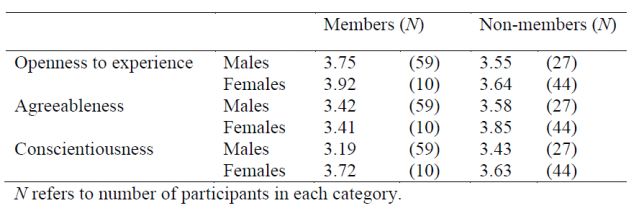Openness
The Misunderstood Personality Profile of Wikipedia Members
Contrary to prior claims, Wikipedians are hardly "grumpy and close-minded"
Posted March 11, 2013
A few years ago, New Scientist website published an article called “Wikipedians are grumpy and close-minded” reporting the findings of a study claiming that members of Wikipedia are lower than non-members in the personality traits of agreeableness and openness to experience.[1] The claims in this article were widely repeated – and apparently believed – across the internet. These results were not predicted by the study authors and were actually counterintuitive. In spite of this, reactions along the lines of “Yes, makes perfect sense” seem to have been common in the blogosphere (e.g. see here, and here). One commentator I came across went so far as to suggest that user generated online content in general is produced for antisocial motives.[2] It is therefore unfortunate that the author of the New Scientist article did not appear to have read the original article too carefully, because it contains serious errors and even contradicts itself.

The study findings seem surprising because agreeableness is usually associated with helping behaviour and Wikipedians freely volunteer their services; openness to experience is associated with intellectual interests and Wikipedians help promulgate knowledge. The study authors speculatively proposed that the prosocial behaviour associated with sharing information on Wikipedia is associated with ‘egocentric motives’. They also claimed that the oddly lower openness of Wikipedians also reflected these ‘egocentric motives’. There are problems with these conclusions. The most glaring one is that their stated conclusions about openness to experience flatly contradict the data they provide in the article. See the Table below for an illustration.

Differences in personality traits reported in the study (note that a 1-5 scale is used)
As can be seen, contrary to what was reported, Wikipedia members of both sexes actually had higher mean scores on openness to experience compared to non-members, not lower ones. Perhaps the authors’ were confused by the presence of a serious typographical error that appears in the Results section of their article (on p. 680). The sentence starts off saying “a significant difference was found for the openness trait” but then goes on to say, “that is, the average agreeableness trait among Wikipedia members was significantly lower…” (Emphasis added). The second part of the sentence is a repetition of a phrase from the previous sentence describing the results regarding agreeableness. In the Discussion section they then go on to state that Wikipedians were in fact lower in openness to experience (perhaps they wrote this after reading the typo in their Results) and then go on to speculate about why. But of course, since their results are back-to-front, their conclusions about openness to experience make little sense.
For example, after having mistakenly decided on the counter-intuitive finding that Wikipedians, with their open sharing of knowledge and ideas, are actually low in openness to experience, they then interpret this spurious result in terms of “egocentric” motives. Although correct that Wikipedians were somewhat lower in agreeableness than non-members, and lower agreeableness may be associated with greater egotism, there is no research evidence linking egocentric motives to low openness to experience. Since the results actually showed that members were higher not lower in openness to experience compared to non-members, it may be more likely that they are in fact motivated by intellectual curiosity and love of knowledge, motives actually known to be consistent with high openness to experience.
Now consider the results for agreeableness. While true there was a statistically significant difference, how large was it really? On a 5-point scale, female members had an average difference of 0.44; the difference for males was 0.16, A difference of less than half a point is not a huge one. And also consider that although somewhat lower, the average agreeableness for Wikipedians still scored above 3, the mid-point of the scale. A reasonable interpretation would be that although somewhat less agreeable, they were not particularly disagreeable either. The authors speculated that lower agreeableness was associated with “egocentric motives”. However, agreeableness is a very broad feature of personality that has a number of components, so the result is open to a range of possible interpretations. One possible explanation, admittedly speculative, is that members might be more argumentative than non-members and hence more willing to engage in debate, and debate is a daily occurrence on Wikipedia. Futhermore, according to a 2011 survey of Wikipedia editors over 91% of editors are male. In line with this gender imbalance, over 85% of members in this study sample were male, with the result that only 10 female members were included. Since the difference between male members and non-members was fairly tiny, (and there were so few female members in this study sample) it hardly seems fair to characterise Wikipedians in general (who are mostly men) as particularly “grumpy” compared to other people.
One final discrepancy in the research report was that in the report’s Abstract, the authors reported that Wikipedians were lower in conscientiousness than non-members, but they did not state this conclusion anywhere in the body of the report. Their Table of results shows that male members were somewhat lower than male non-members, but female members were slightly higher than female non-members, so the differences in conscientiousness are inconsistent across gender. The authors did note that females generally were significantly higher in conscientiousness than males generally, which fit with the Table’s results and with more generally research findings.
So rather than saying that Wikipedians are “grumpy and close-minded” due to “egocentric motives” as people have been led to believe, it may be closer to the truth that they are actually “argumentative and open-minded” perhaps due to their passion for sharing information. But to be really honest, the results are still open to interpretation because these are fairly broad personality dimensions that encompass a range of narrower personality traits. Assessing such narrower traits would help explain why these personality differences were found. Whatever the reason for the findings may be, cynical views about the motives of people who contribute to Wikipedia in particular, or those who generate content on the internet more generally, hardly seem justified.
Follow me on Facebook, Google Plus, or Twitter.
© Scott McGreal. Please do not reproduce without permission. Brief excerpts may be quoted as long as a link to the original article is provided.
Other Social Media related posts
Is there something wrong with people who don't use Facebook? What research really says about non-users. One of my most popular posts!
Twitter and Mortality: To Tweet or Not to Tweet? Applying terror managment theory to Twitter usage.
Image credit: Vincent Wei courtesy of Flickr
Notes
[1] Amichai–Hamburger, Y., Lamdan, N., Madiel, R., & Hayat, T. (2008). Personality Characteristics of Wikipedia Members. Cyberpsychology and Behavior, 11, 679 – 681.
[2] This blogger justified this cynical comment by referring to a study about YouTube, that found that people decide whether to upload new videos depending on how many views their previous uploads received, and concluded that attention from viewers is seen as a kind of "payment" for uploading. Doing something to receive some form of recognition hardly seems "antisocial" though, or even unusual, as it is a universal norm of human behaviour.




